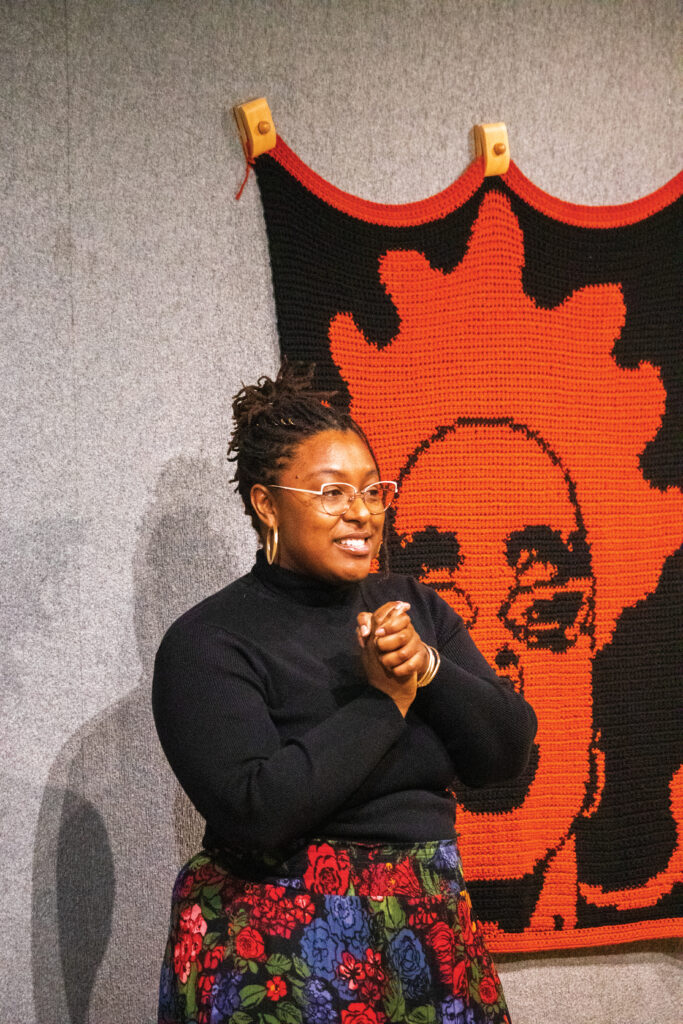Detroit-based fiber artist Cat Washington presents “Insoluble Fibers” in hopes of inspiring the community through her story and overcoming her struggles through fiber art.
“Insoluble Fibers” is Washington’s solo exhibition and is a testament to the transformative power of art as a means of self-discovery and healing. In front of 29 members of the community, she presented at the Fine Art Gallery on Thursday, Feb. 13, from 5 p.m. to 6:30 p.m.
Since embarking on her artistic journey in 2023, she has made significant strides in the art world, participating in 13 exhibitions, two artist residencies and being featured in Fiber Art Now, a prestigious fiber art magazine publication.

colorful single-stitch crochet patterns. Photo by: Sam Mulder| Torch Photographer
Presenting to a public university, Washington wanted to bring her art so that students could reflect on their personal lives and struggles.
“A lot of my art is finding self-trust through each piece,” Washington said. “And it has me thinking about the students here, and I’m hoping they’re able to find trust in themselves. And I hope my work speaks to that, and that they can reflect on that while they’re here because I think that is very important.”
In creating her art, Washington established four pillars of value that are part of her show. One is disordered, which are pieces that speak to her eating disorder experience. Another is mediation on self, which includes her self-portraits. Another was Fiber Bizarre, where Washington has fun using different fibers. And then there was community.
Washington expressed the symbolism behind “Insoluble Fibers.”
“It represents a journey, recovery, perspective and the ability to be able to look back. I tie in that meaning towards my eating disorder and addiction in a way, because it never goes away,” Washington said. “The frequency of what it means to engage in the harmful behavior changes over time. It used to be very devastating when I would have episodes and now they’re signs that I was missing something in my life. It represents that process of me being able to look back on all that and being mentally understood as to what my recovery has meant so far.”
Washington touched on loneliness being a trigger for her, and she stated that she needed to lean more on the community. In addition, she was why “community” was one of the four pillars of value of her show.
Fine Arts Gallery and Museum Director Carrie Weis found Washington’s story and art important for the Ferris community to hear about.
“[Washington] has a background in research and public health, she came to art as a way to recover from her eating disorder,” Weis said. “Through her art and her personal story, we can encourage conversation and dialogue about many topics such as how art can be used to explore personal issues and how it can provide an avenue for healing. We hope the gallery offers a space for reflection, understanding and growth while looking at difficult topics.”
Weis also said that sharing stories through art is important because it allows people to express and communicate complex emotions, ideas and experiences in ways that words sometimes can’t capture.
Multicultural Student Services Director Chris Sanders enjoyed Washington’s story since he had dealt with challenges during his life.
“I’ve also been through some challenges with self-image and other personal things,” Sanders said. “I found my own ways to overcome those challenges. It was inspiring to hear how she’s got out of those challenges and kept herself out of the personal challenges that she had through art form. It was really cool hearing what she had to say.”
Washington is also the founder of the Black, Indigenous, People of Color Fiber Artist Meetup. Through that, she’s able to foster community within her fiber art.
“Insoluble Fibers” will remain in the Fine Art Gallery until March 28. Ferris students and community members can view the artwork during the gallery’s open hours. The gallery is open every weekday from 10 a.m. to 3 p.m.
